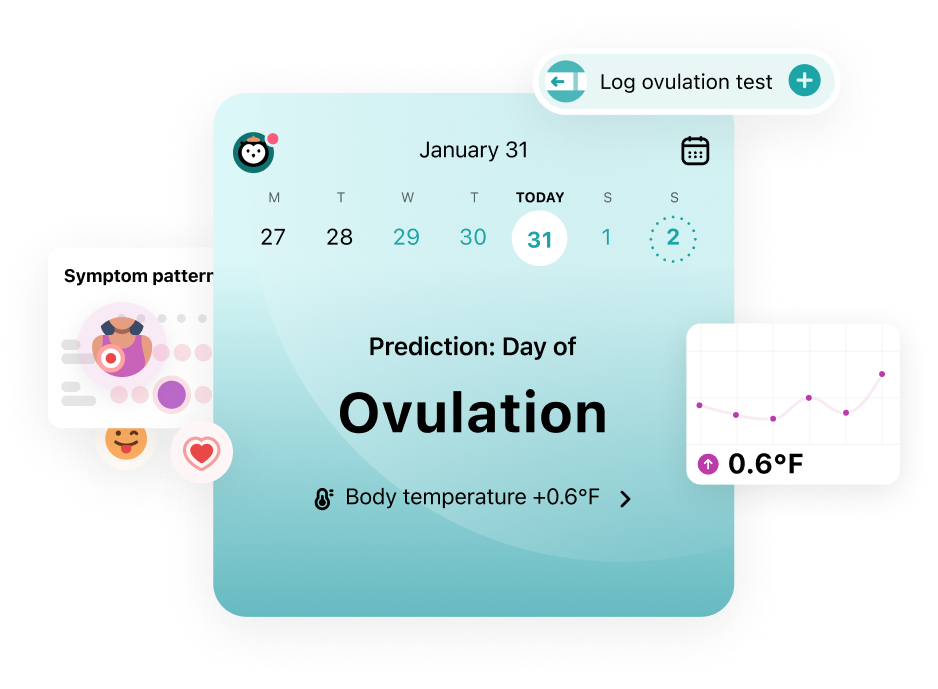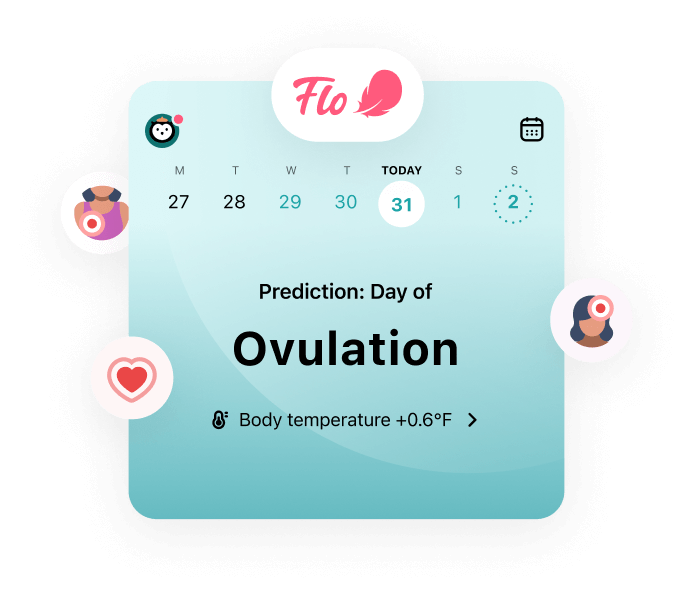If your periods are irregular, you may want to know if and when you ovulate — especially if you’d like to get pregnant. Find out which ovulation tracking methods are best for unpredictable cycles with advice from a Flo expert.
-
Tracking cycle
-
Getting pregnant
-
Pregnancy
-
Help Center
-
Flo for Partners
-
Anonymous Mode
-
Flo app reviews
-
Flo Premium New
-
Secret Chats New
-
Symptom Checker New
-
Your cycle
-
Health 360°
-
Getting pregnant
-
Pregnancy
-
Being a mom
-
LGBTQ+
-
Quizzes
-
Ovulation calculator
-
hCG calculator
-
Pregnancy test calculator
-
Menstrual cycle calculator
-
Period calculator
-
Implantation calculator
-
Pregnancy weeks to months calculator
-
Pregnancy due date calculator
-
IVF and FET due date calculator
-
Due date calculator by ultrasound
-
Medical Affairs
-
Science & Research
-
Pass It On Project New
-
Privacy Portal
-
Press Center
-
Flo Accuracy
-
Careers
-
Contact Us
My periods are irregular. How do I track ovulation?


Every piece of content at Flo Health adheres to the highest editorial standards for language, style, and medical accuracy. To learn what we do to deliver the best health and lifestyle insights to you, check out our content review principles.
You may have heard that ovulation happens mid-cycle. But what if your periods are irregular and mid-cycle means something very different from one month to the next?
Irregular periods are when cycles are shorter than 21 days or longer than 35, when you miss three or more periods in a row, or when cycles vary by more than nine days in length. Irregular periods can be stressful and worrying when you’re trying to get pregnant. But while tracking ovulation with irregular periods can be more difficult, it’s by no means impossible.
Keep reading to find out the best ovulation tracking methods for your cycle, plus what might be making them so unpredictable in the first place.
Key takeaways
- Tracking ovulation with irregular periods can be tricky and can make traditional tools like the calendar method inaccurate. However, it’s not impossible.
- Methods like ovulation tests, basal body temperature (BBT) tracking, and cervical mucus monitoring can be great options to find out if and when you’re ovulating with irregular periods.
- You can also use a period-tracking app like Flo to get to know your cycle even better and learn more about your ovulation signs.
- There are many causes of irregular periods, from lifestyle factors to certain medical conditions. Speak to your doctor if your periods are often irregular. They can help you figure out what’s going on. Know that irregular cycles don’t necessarily mean that you’re not ovulating at all or that you can’t get pregnant.

 Over
7.8M
ratings averaging
4.8/5
*
Over
7.8M
ratings averaging
4.8/5
*
Understand your fertility better with the Flo app
- Learn more about your fertility signals
- Improve ovulation predictions by tracking temperature via Apple Watch
- Log your ovulation test results
 Over
7.8M
ratings averaging
4.8/5
*
Over
7.8M
ratings averaging
4.8/5
*

Trying to conceive?
The Flo app can help you better understand your fertility

 Over
7.8M
ratings averaging
4.8/5
*
Over
7.8M
ratings averaging
4.8/5
*
Understand your fertility better with the Flo app
- Learn more about your fertility signals
- Improve ovulation predictions by tracking temperature via Apple Watch
- Log your ovulation test results
Do irregular periods affect ovulation?
You might think of your period as being the definitive moment in your cycle, but this isn’t strictly the case. “It should be the other way around: Ovulation is generally what drives the menstrual cycle,” says Dr. Jenna Flanagan, academic generalist obstetrician and gynecologist, Beth Israel Deaconess Medical Center, Massachusetts, US. “So, irregular ovulation would affect periods and cause some irregularities.”
Let’s briefly recap what happens in a menstrual cycle, along with the role ovulation plays in the process of getting your period:
- The follicular phase
Day one of your cycle kicks off with the first day of your period when the level of your hormone estrogen starts to rise. This causes the lining of your uterus to grow and thicken. Meanwhile, follicle-stimulating hormone (FSH) causes the follicles in your ovaries to develop. One of these will form a fully mature egg. If the length of your menstrual cycle varies, it will be because of variations in the duration of this follicular phase.
- Ovulation
Next, peaking levels of estrogen cause a spike in luteinizing hormone (LH). This prompts the follicle in one ovary to release the mature egg, and voila: You have ovulated.
- The luteal phase
Your egg can travel through one of your uterine tubes, where it could be fertilized by a sperm. At the same time, LH causes the hormone progesterone to rise, which further prepares the lining of your uterus for pregnancy.
The next step has two possible outcomes, and it all depends on what happens to your egg. If the egg gets fertilized, it attaches itself to the lining of your uterus, and you officially become pregnant. This process is called implantation. Alternatively, if your egg doesn’t develop into a pregnancy, your estrogen and progesterone levels drop. This causes you to shed the lining of your uterus, and you will have a period.
“It’s this decrease in hormones that triggers menstruation,” says Dr. Flanagan. “Therefore, if ovulation does not happen regularly, it can lead to irregularity of the hormones and some irregular bleeding. This would make it harder to predict when ovulation occurs.”
Take a quiz
Find out what you can do with our Health Assistant
Now, here’s where things get more complicated. Although ovulation (that doesn’t lead to pregnancy) induces your period, it’s important to know that having a bleed doesn’t necessarily mean that you have ovulated. Confusing, right? We’ll explain.
Sometimes, irregular periods are a sign that you have not ovulated at all — these are what doctors call anovulatory cycles. In these cycles, your levels of estrogen rise, but you don’t get the rise of progesterone that follows ovulation. Without the support of progesterone, rising estrogen causes your uterine lining to grow and thicken until it runs out of blood supply. At this point, the lining will shed, and you’ll have a bleed. Having high levels of estrogen without progesterone can also cause the blood loss to be heavier and more prolonged than normal.
Importantly, this is abnormal uterine bleeding and not the same thing as a period. Because it’s not driven by ovulation, abnormal uterine bleeding tends to happen more or less frequently than a regular period. Another telltale sign of anovulatory cycles is when the difference between your longest and shortest cycles is greater than seven to nine days. As explained above, sometimes abnormal uterine bleeding is also heavier than a period or goes on for eight days or longer. You can use an app like Flo to track changes to your period to help you spot when something might be different.
So, irregular periods might be a sign that you’re not ovulating in every cycle or even at all. The ovulation tracking methods below can help you find out, but you should also speak to your doctor (particularly if you’re thinking of trying for a baby).
While it’s important to know that irregular periods can be a symptom of anovulatory cycles, it’s not always the case. Anovulation is also very treatable. So, if you’re worried, take a deep breath — there is no need to panic.
How to track ovulation with irregular periods
When you have irregular periods, some ovulation tracking tools — like the calendar method — can be inaccurate. You can use a cycle-tracking app like Flo to help you spot patterns and changes in your cycle. This may be helpful when it comes to talking to your doctor about your cycle length and symptoms.
While you might not be able to use traditional paper-and-pen calendar methods to track when you might be ovulating, you have other options. Here are the best methods to try instead.

Take ovulation tests
Ovulation tests work by detecting the surge of LH in your pee. Like pregnancy tests, you need to either hold the testing stick under your urine stream or dip it in a container containing your urine. If the test is positive, it means that ovulation is likely to happen in the next 24 hours.
Usually, experts recommend that you start testing from day 10 of your cycle or four days before you expect to ovulate. Of course, this isn’t so straightforward if your cycles are irregular. “Unfortunately, if your periods are irregular, it would be difficult to know when to test,” says Dr. Flanagan. “However, if you test more frequently, then it may be possible to identify the LH surge if ovulation is occurring.”
When you’re not sure when you ovulate, Dr. Flanagan recommends doing daily ovulation tests to avoid missing the LH surge. But if this isn’t for you, that’s totally understandable — having to test that frequently can quickly become a chore, not to mention expensive. However, the tests are up to 99% accurate, so they can be a reliable way to find out whether you are ovulating or not.
Monitor your body temperature
Basal body temperature (BBT) is your temperature when you are completely at rest. Ovulation causes this temperature to rise very slightly, by around 0.4º F (0.22º C) to 1º F (0.56º C). So, if you measure your BBT every day, you’ll be able to spot when you’ve ovulated. “This is a method that can be used regardless of your bleeding calendar,” says Dr. Flanagan. “The temperature can be monitored daily and graphed to predict when ovulation would occur.”
Unlike ovulation kits, BBT tracking will tell you that you already have ovulated (rather than that you’re about to). So, when you notice the temperature rise, it can reassure you that you have had an ovulatory cycle. However, it also means it’s already too late to try and get pregnant that month if you’re trying. After tracking BBT for a few months, you’ll be able to spot any patterns and plan to have sex on the days leading up to the time you tend to ovulate. You can also use an app like Flo to track any other symptoms around this point in your cycle.
You’ll need to use a special BBT thermometer that’s sensitive enough to pick up the slight shift and take the measurements before you get out of bed each morning.
Get to know your cervical mucus
You don’t have to invest in tests and devices to find out when you’re ovulating with irregular periods — your body can give you the information for free. Just before you ovulate, your vaginal discharge (also known as cervical mucus) will become clear and slippery. “This can be monitored daily, and the mucus will change during ovulation to be more like egg whites in texture,” says Dr. Flanagan.
As one of the key symptoms of ovulation, these cervical mucus changes are your body’s clever way of helping sperm swim through your reproductive tract to meet your egg. The discharge usually lasts for about four days — these are your most fertile days. After you’ve ovulated, your discharge will dry up until your period starts.
So, checking your cervical mucus daily can be a great way to find out when you ovulate with irregular periods. You might notice the changes by looking in your underwear or checking the toilet paper after you wipe, or you can use your fingers. To do this, wash your hands and then place one finger in your vagina. Take your finger out to examine the discharge — you can try pressing your thumb and finger together to see if it stretches.
If you find that the discharge is like raw egg whites — i.e., wet, stretchy, slippery, or soaking your underwear — it’s likely that you’ll ovulate in the coming days. If you’re trying to get pregnant, consider this your signal to have sex. You can also log the changes in an ovulation-tracking app like Flo. Doing this over several months can help you get to know any patterns in your cycle.
When to see a gynecologist about irregular periods
Dr. Flanagan advises speaking to your health care provider if your cycles “are more than 35 days apart or more frequent than every 21 days for multiple cycles.” She adds: “Occasional irregular bleeding could be triggered by an illness or the start of a new medication, but if persistent, it should be evaluated for other causes.”
It can be unnerving to experience irregular periods, especially when you’re thinking about starting a family. Not only do irregular periods make it harder to pinpoint your fertile window, but it can be more difficult to spot the signs of pregnancy.
However, know that some variation in your menstrual cycle is normal, so having the odd irregular period may be nothing to worry about.
Sometimes, lifestyle factors like stress and gaining or losing a significant amount of weight can be enough to make your periods go a bit haywire. Irregular periods can also be common in people when they first start their periods and during perimenopause (the stage of life before your periods naturally stop completely, which often happens at around age 50).
However, there are times when irregular periods are a sign of an underlying condition. Polycystic ovary syndrome (PCOS) is the most common condition causing irregular periods. In fact, PCOS affects an estimated 8% to 13% of reproductive-aged women — so if you find out you have PCOS, you’re in good company.
The condition causes cysts (small sacs of fluid) containing immature eggs (follicles) to develop inside your ovaries. The follicles fail to release eggs regularly, leading to irregular periods. But while PCOS can make it harder to get pregnant, it doesn’t mean you can’t conceive. Please feel reassured that it is one of the most treatable causes of infertility in women.
Thyroid or pituitary gland disorders can also be the root cause of irregular periods. Your thyroid and pituitary glands are both responsible for producing certain hormones. When these glands aren’t working properly, it can cause a hormonal imbalance and make your periods irregular. However, these conditions can also be treated.
Your doctor will be able to help you figure out what’s causing your irregular periods and may want to perform blood tests and a pelvic ultrasound. However, it’s really important to keep in mind that unpredictable cycles don’t necessarily mean you have an underlying condition — or that you will struggle to get pregnant with irregular periods. Remember, if you’re ovulating at all, there is a chance you could conceive. So, if you try any of the tracking methods above and discover that you are ovulating (even irregularly), you are off to a great start.
More FAQs
What's the best ovulation test for irregular periods?
“The best ovulation test for irregular periods is any tracking mechanism that is not dependent on a calendar or based on counting from the start of a menstrual cycle,” says Dr. Flanagan. “Most urine tests are reliant upon LH [the ovulation hormone] surges instead.”
How often should you take ovulation tests with irregular periods?
“If it is not possible to predict your ovulatory window, then you’d need to use LH testing kits daily to make sure you don’t miss a surge,” says Dr. Flanagan. You should also aim to take the test at the same time each day, whether your periods are irregular or not.
Can you induce ovulation with irregular periods?
Yes, fertility drugs can regulate or stimulate ovulation when you have irregular periods. For example, clomiphene citrate causes the pituitary gland to release more FSH and LH, the key hormones behind ovulation. This is usually the first line of fertility treatment if you’re younger than 39 and don’t have PCOS.


Hey, I'm Anique
I started using Flo app to track my period and ovulation because we wanted to have a baby.


The Flo app helped me learn about my body and spot ovulation signs during our conception journey.


I vividly
remember the day
that we switched
Flo into
Pregnancy Mode — it was
such a special
moment.
Real stories, real results
Learn how the Flo app became an amazing cheerleader for us on our conception journey.
References
“Calculating Your Monthly Fertility Window.” Johns Hopkins Medicine, www.hopkinsmedicine.org/health/wellness-and-prevention/calculating-your-monthly-fertility-window. Accessed 10 May 2024.
“Cervical Mucus.” Cleveland Clinic, my.clevelandclinic.org/health/body/21957-cervical-mucus. Accessed 10 May 2024.
“Cervix.” Cleveland Clinic, my.clevelandclinic.org/health/body/23279-cervix. Accessed 10 May 2024.
“Definitions of Health Terms: General Health.” MedlinePlus, 9 May 2024, medlineplus.gov/definitions/generalhealthdefinitions.html.
Dreisler, Eva, et al. “Perimenopausal Abnormal Uterine Bleeding.” Maturitas, vol. 184, no. 107944, 21 Feb. 2024, www.maturitas.org/article/S0378-5122(24)00039-2/abstract.
“Female Infertility.” Mayo Clinic, 27 Aug. 2021, www.mayoclinic.org/diseases-conditions/female-infertility/diagnosis-treatment/drc-20354313.
“Hypothyroidism and Infertility: Any Connection?” Mayo Clinic, 20 May 2023, www.mayoclinic.org/diseases-conditions/female-infertility/expert-answers/hypothyroidism-and-infertility/faq-20058311.
“Irregular Periods.” Cleveland Clinic, my.clevelandclinic.org/health/diseases/14633-abnormal-menstruation-periods. Accessed 10 May 2024.
Jones, Katrina, and Sharon Sung. “Anovulatory Bleeding.” StatPearls Publishing, StatPearls Publishing, 9 July 2023, www.ncbi.nlm.nih.gov/books/NBK549773/.
“Menstrual Cycle.” Cleveland Clinic, my.clevelandclinic.org/health/articles/10132-menstrual-cycle. Accessed 10 May 2024.
“Ovulation.” Cleveland Clinic, my.clevelandclinic.org/health/articles/23439-ovulation. Accessed 10 May 2024.
“Ovulation Predictor Test Instructions.” UNC School of Medicine, www.med.unc.edu/timetoconceive/study-participant-resources/ovulation-predictor-test-instructions/. Accessed 10 May 2024.
Parker, James N., and Philip M. Parker. Anovulation: A Medical Dictionary, Bibliography, and Annotated Research Guide to Internet References. Icon Health Publications, 31 Aug. 2004, www.waterstones.com/book/anovulation-a-medical-dictionary-bibliography-and-annotated-research-guide-to-internet-references/icon-health-publications/9780497000745.
Pinkerton, JoAnn V. “Pharmacological Therapy for Abnormal Uterine Bleeding.” Menopause, vol. 18, no. 4, Apr. 2011, pp. 453–61, doi:10.1097/gme.0b013e318212499c.
“Polycystic Ovary Syndrome.” Office on Women’s Health, 22 Feb. 2021, www.womenshealth.gov/a-z-topics/polycystic-ovary-syndrome.
“Polycystic Ovary Syndrome.” World Health Organization, 28 June 2023, www.who.int/news-room/fact-sheets/detail/polycystic-ovary-syndrome.
“Polycystic Ovary Syndrome (PCOS).” Mayo Clinic, 8 Sep. 2022, https://www.mayoclinic.org/diseases-conditions/pcos/symptoms-causes/syc-20353439.
“Should You Use Ovulation Strips to Get Pregnant?” Cleveland Clinic, 12 May 2021, health.clevelandclinic.org/should-you-use-ovulation-strips-to-get-pregnant.
Steward, Kaitlyn, and Avais Raja. “Physiology, Ovulation and Basal Body Temperature.” StatPearls Publishing, StatPearls Publishing, 17 July 2023.
Su, Hsiu-Wei, et al. “Detection of Ovulation, a Review of Currently Available Methods.” Bioengineering and Translational Medicine, vol. 2, no. 3, 25 Feb. 2017, pp. 238–46, doi.org/10.1002/btm2.10058.
Thiyagarajan, Dhanalakshmi K., et al. “Physiology, Menstrual Cycle.” StatPearls Publishing, StatPearls Publishing, 24 Oct. 2022.
Torborg, Liza. “Mayo Clinic Q and A: Irregular Periods, Infertility Not Necessarily Linked.” Mayo Clinic News Network, 9 Jan. 2018, newsnetwork.mayoclinic.org/discussion/mayo-clinic-q-and-a-irregular-periods-infertility-not-necessarily-linked/.
“Using Ovulation Tools to Predict Fertility.” Mayo Clinic Health System, 13 June 2023, www.mayoclinichealthsystem.org/hometown-health/speaking-of-health/using-ovulation-kits-to-predict-fertility.
“Why Are My Periods So Irregular, Heavy and Painful?” Mayo Clinic, 22 Aug. 2023, www.mayoclinichealthsystem.org/hometown-health/speaking-of-health/why-are-my-periods-so-irregular-heavy-and-painful.
History of updates
Current version (13 May 2024)
Published (20 May 2024)
In this article

Get your personal guide to fertility
-
Learn how to read your body's ovulation signals
-
Find daily conception tips from our experts
-
Chat with others who are trying to get pregnant




